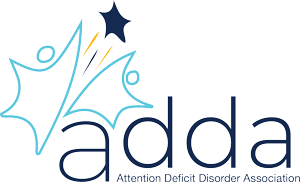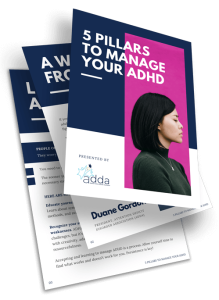
Understanding ADHD Brain Fog: Causes, Symptoms, & Treatment
Imagine being surrounded by a thick fog—you can’t see clearly, and every step feels uncertain.
Being in a mental fog can feel very similar. You might have experienced brain fog if you’ve been in a hazy state where you can’t seem to think clearly or focus on each step of the task.
Attention-deficit/hyperactivity disorder (ADHD) can contribute to this fuzziness in thinking.
ADHD brain fog is a mental state where everything feels unclear or confusing. Because of this, focusing, remembering details, planning, or making decisions becomes almost impossible.
It’s essential to understand which ADHD symptoms are contributing to it. That way, you can take proactive steps to nip the problem in the bud and regain better mental clarity!
What Is Brain Fog?
Brain fog is mental cloudiness or fuzziness that can also be described as a slowdown in brain function.
Brain fog is not a medical term or official diagnosis. While you can’t get diagnosed with brain fog, it’s still a real issue that can significantly disrupt your daily activities and tasks.
Brain fog can occur for various reasons, such as a lack of sleep, poor nutrition, stress, or the side effects of certain medications.[1] It is also a common symptom people get after recovering from COVID-19.[2]
ADHD is another possible cause of brain fog. Many ADHDers experience brain fog due to their ADHD symptoms, which can include poor focus, impulsivity, or forgetfulness.[3]
ADHD Brain Fog Symptoms
ADHD brain fog can look different from person to person. However, there are some hallmark symptoms you can look out for. These include:
- Mental fatigue or slowdown
- Mental cloudiness or confusion
- Daydreaming or mind wandering
- Poor focus and difficulty completing tasks
- Forgetting important tasks or details
- Low motivation and productivity
- Feeling disconnected from your surroundings
- Difficulty processing or expressing your thoughts
- Getting overwhelmed
Because of these symptoms, ADHD brain fog can be disruptive in different ways. For example, it can make completing your tasks at work or school or following through with house chores and errands challenging.
ADHD brain fog isn’t just “in your head” — it’s a genuine challenge that many people with ADHD experience. Recognizing it as a real issue allows you to address it and seek support or professional help to reduce its symptoms.

Does ADHD Cause Brain Fog?
ADHD symptoms can contribute to brain fog. Research shows that the ADHD brain functions differently from a non-ADHD one. One key difference lies in the disruption in the transmission of dopamine, a chemical messenger of the brain.[4]
Apart from chemical changes, ADHD can also impact the structure and connectivity between different regions.
Let’s explore this further.
Exploring the Link Between ADHD and Cognitive Function
ADHD is known to alter brain function in various ways.
Research shows that the ADHD brain operates differently. Some areas are hyperactive (more active than normal), and others are hypoactive (less active than normal).[5]
For instance, the brain’s default mode network (DMN) tends to be hyperactive in ADHD. The DMN refers to a group of areas of the brain that turn on when you’re daydreaming. Due to the overactivity of the DMN, it can be challenging to stay focused on the task at hand.[5]
Additionally, ADHD is linked to structural differences in the brain, particularly in the prefrontal cortex. The way various brain regions communicate with one another also differs.[6]
All these factors influence how information is processed. They can lead to challenges with memory, organization, focus, and decision-making. As a result, many ADHDers experience mental fogginess in their day-to-day.
How ADHD Impacts Memory and Focus
Working memory is like a mental sticky note in your brain. You use it to hold shorter-term key pieces of information to complete a task.
For someone with ADHD, this “mental notepad” might feel smaller. The information might also fade faster or get overwritten by distractions, making it harder to follow through on tasks.
Focus is another challenging area for ADHDers. While you might quickly associate ADHD with being easily distracted, it can also lead to periods of hyperfocus. This is where a person becomes so absorbed in a task that they lose track of time and become unaware of their surroundings.
Both extremes—a lack of focus or an overdrive of focus—make it harder to manage time effectively and complete tasks that truly matter.
The Role of Neurotransmitters in ADHD Brain Fog
Dopamine deficiency is linked to ADHD.[4] It’s responsible for how the brain processes motivation, pleasure, and reward. A dopamine deficiency can make it harder for ADHDers to stay motivated. They may also struggle to delay smaller, shorter-term rewards for greater but longer-term ones.[4]
As a result, ADHDers may experience mental sluggishness or fatigue and have lower motivation. This is especially so when managing tasks that are less stimulating or don’t offer immediate rewards.

The Difference Between ADHD and Usual Brain Fog
ADHD brain fog and regular brain fog may seem similar, but they affect people in different ways.
ADHD brain fog results from the chemical balance, structure, and connectivity of the ADHD brain. It’s a longer-term issue that doesn’t just come and go.
In contrast, regular brain fog is typically temporary and can occur due to stress, lack of sleep, or other external factors. It usually resolves once you address the underlying cause.
ADHD brain fog can be more challenging to manage because it’s linked to the way your brain functions.
However, the right ADHD treatment plan, practical strategies, and creation of habits can help reduce or prevent it.
What Does Brain Fog Feel Like?
Brain fog feels like a haze. It can make it hard to articulate ideas or retrieve information that is “in there” but just out of reach. Therefore, everyday tasks, like keeping up in a conversation or following instructions, can become draining.
Dealing with brain fog is tough—it’s frustrating and can take a toll on you emotionally, mentally, and even physically.
Emotional and Mental Impacts of ADHD Brain Fog
In the long term, ADHD brain fog can affect your mental and emotional well-being.
You may struggle with work tasks and daily activities that others seem to breeze through. This can lead to frustration and self-doubt and might even contribute to feelings of depression or anxiety. In fact, ADHD can increase a person’s risk of depression later on in life.[7]
The mental cloudiness and fatigue you feel could also make it difficult to find motivation to do things that need to get done. This can increase procrastination, guilt, and stress.
Physical Symptoms That Accompany Brain Fog
Though brain fog primarily affects how your brain functions, it might also come with physical symptoms.
Physical exhaustion, headaches, muscle tension, and low energy levels are possible symptoms of ADHD brain fog. These symptoms might come about due to the stress and frustration of managing daily challenges. Disrupted sleep can also contribute to these physical symptoms. Research has demonstrated a strong link between adult ADHD and sleep problems.[8]
You can reduce these physical symptoms by improving your lifestyle habits through regular exercise and proper sleep hygiene.

Preventing ADHD Brain Fog
ADHD brain fog is a chronic problem for many ADHDers. However, preventing or reducing its effects on your daily life isn’t impossible.
The greatest positive changes stem from small but consistent steps you can take each day. By gradually modifying your lifestyle habits, you can create a healthy environment for your mind to thrive.
Lifestyle Changes to Minimize ADHD Brain Fog
Certain lifestyle modifications can reduce brain fog naturally.
One of the best examples is getting regular exercise. Even a single exercise session can reduce ADHD symptoms and enhance cognitive function.[9]
You can also start practicing mindfulness as part of your everyday routine. Set aside a few minutes daily to sit quietly and practice staying focused on the present moment.
Foods and Supplements to Support Brain Health
A healthy diet can help improve brain health and ensure you have enough energy to function and think at your best throughout the day. Certain foods, such as those rich in omega-3 fatty acids, can be especially beneficial for cognitive function. These include fatty fish such as salmon and nuts and seeds like chia seeds and walnuts.
If you practice a complete and healthy diet, taking supplements is unnecessary. However, if you’re too busy to have a daily balanced meal, you can try supplements to support brain function. Remember to consult a healthcare professional before starting anything new.
Sleep and Brain Fog in ADHD
Sleep deprivation can worsen brain fog.
The following are some practical tips you can implement to get better sleep at night:
- Stick to a regular sleep schedule.
- Keep your bedroom dark and at a comfortable temperature for sleep.
- Limit how much time you spend on your devices before bed.
- Avoid caffeine, alcohol, or heavy meals close to bedtime.
- Have a routine to unwind before bed, such as listening to music, taking a warm bath, or doing simple breathing exercises.
ADHD can contribute to long-term sleep problems. If your sleep problems don’t seem to go away even with healthy sleep hygiene practices, it’s always best to seek professional help.

Tips for Coping with ADHD Brain Fog
Here are some practical ways to manage ADHD brain fog in your day-to-day.
- Create a conducive environment: Declutter your workspace, find a quiet spot to work, or invest in noise-canceling headphones.
- Build a routine: A routine can help reduce mental load, especially when you’re in a rush. Build a simple routine, such as in the morning or evening, when you need to be on time or get things done.
- Use organizational tools: ADHD organizational tools like planners or smartphone apps can help you better manage your tasks and deadlines.
Treatment
There’s no actual ADHD brain fog treatment. However, there are ways you can treat and manage your ADHD symptoms, which, in turn, can help reduce ADHD brain fog.
Many adult ADHDers benefit from taking ADHD medications. The most commonly used medications are stimulants, which help to balance the level of chemical messengers in the brain.
Apart from medications, there are ADHD therapies that can help manage the symptoms of brain fog. For example, cognitive behavioral therapy (CBT) helps ADHDers pinpoint unhelpful thinking patterns and beliefs and explore better ones to replace them with.
Clearing the Mental Fog Takes Time and Patience
Struggling with ADHD brain fog doesn’t reflect laziness or irresponsibility. It’s linked to the unique characteristics of the brain. It’s a real issue requiring time, patience, and support.
Treatment for ADHD and practical strategies to improve focus, organization, and planning can help to minimize the impact of ADHD brain fog.
If you want to learn more about managing ADHD-related issues, check out ADDA+. This online resource hub has expert-crafted materials and courses on overcoming different ADHD-related challenges. You can also join a community of adult ADHDers on a similar journey to share support, advice, and tips!
References
[1] Kverno K. (2021). Brain Fog: A Bit of Clarity Regarding Etiology, Prognosis, and Treatment. Journal of psychosocial nursing and mental health services, 59(11), 9–13. https://doi.org/10.3928/02793695-20211013-01
[2] Van der Feltz-Cornelis, C., Turk, F., Sweetman, J., Khunti, K., Gabbay, M., Shepherd, J., Montgomery, H., Strain, W. D., Lip, G. Y. H., Wootton, D., Watkins, C. L., Cuthbertson, D. J., Williams, N., & Banerjee, A. (2024). Prevalence of mental health conditions and brain fog in people with long COVID: A systematic review and meta-analysis. General hospital psychiatry, 88, 10–22. https://doi.org/10.1016/j.genhosppsych.2024.02.009
[3] de la Peña, I. C., Pan, M. C., Thai, C. G., & Alisso, T. (2020). Attention-Deficit/Hyperactivity Disorder Predominantly Inattentive Subtype/Presentation: Research Progress and Translational Studies. Brain sciences, 10(5), 292. https://doi.org/10.3390/brainsci10050292
[4] Véronneau-Veilleux, F., Robaey, P., Ursino, M., & Nekka, F. (2022). A mechanistic model of ADHD as resulting from dopamine phasic/tonic imbalance during reinforcement learning. Frontiers in computational neuroscience, 16, 849323. https://doi.org/10.3389/fncom.2022.849323
[5] Rubia K. (2018). Cognitive Neuroscience of Attention Deficit Hyperactivity Disorder (ADHD) and Its Clinical Translation. Frontiers in human neuroscience, 12, 100. https://doi.org/10.3389/fnhum.2018.00100
[6] Long, Y., Pan, N., Ji, S., Qin, K., Chen, Y., Zhang, X., He, M., Suo, X., Yu, Y., Wang, S., & Gong, Q. (2022). Distinct brain structural abnormalities in attention-deficit/hyperactivity disorder and substance use disorders: A comparative meta-analysis. Translational psychiatry, 12(1), 368. https://doi.org/10.1038/s41398-022-02130-6
[7] Riglin, L., Leppert, B., Dardani, C., Thapar, A. K., Rice, F., O’Donovan, M. C., Davey Smith, G., Stergiakouli, E., Tilling, K., & Thapar, A. (2021). ADHD and depression: investigating a causal explanation. Psychological medicine, 51(11), 1890–1897. https://doi.org/10.1017/S0033291720000665
[8] Surman, C. B. H., & Walsh, D. M. (2021). Managing Sleep in Adults with ADHD: From Science to Pragmatic Approaches. Brain sciences, 11(10), 1361. https://doi.org/10.3390/brainsci11101361
[9] Mehren, A., Reichert, M., Coghill, D., Müller, H. H. O., Braun, N., & Philipsen, A. (2020). Physical exercise in attention deficit hyperactivity disorder – evidence and implications for the treatment of borderline personality disorder. Borderline personality disorder and emotion dysregulation, 7, 1. https://doi.org/10.1186/s40479-019-0115-2






4 Comments
I noticed the word ‘motivation’ in this article, but it’s not about motivation. It’s about a slight but persistent pain in your head that makes it a struggle to walk, it makes you dizzy and you make mistake after mistake. You feel exhausted even though you’ve had plenty of sleep. As for mindfulness, another fad forced on us by the US. I don’t trust anything coming out of there. I would prefer any kind of meditation to be called a different name. And I’ve done courses on mindfulness. They didn’t help me.
would like to talk to someone who is educated in this field. ADHD and brain fog.
Hi Jim, feel free to search our professional directory for someone suitable to answer your questions about ADHD and brain fog. https://add.org/professional-directory/
thanks for info.